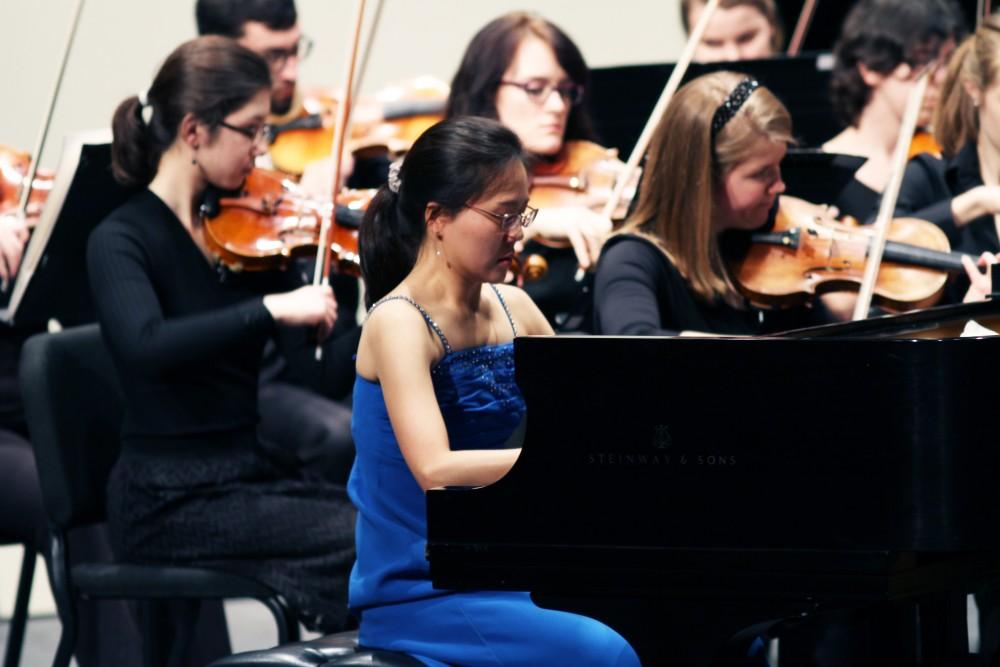Professor Profile: Sookkyung Cho

Guest perfomer, Sookkyung Cho, performs with Grand Valley’s Symphony Orchestra on Dec. 12 in Allendale, MI.
Dec 13, 2015
With her expansive background and pensive view of the arts, Sookkyung Cho is a new music professor this year at Grand Valley State University who is using the keys on her piano to fully unlock the imagination, creativity and potential of not only her students, but also all who hear her play.
Cho said working with students to create works of music is indescribably rewarding for her.
“Creating the most beautiful thing that we can together: I think that’s the most rewarding thing,” she said. “If something just really works and when something just sparkles, you can’t describe the feeling. It’s just there.”
In addition to teaching piano students, Cho appeared in a sparkling blue dress while collaborating with GVSU’s Symphony Orchestra during their Dec. 12 concert, which also featured guest conductor Deborah Freedman.
Orchestra director Henry Duitman said Cho, who accompanied the orchestra for the concert’s climactic rendition of Beethoven’s Piano Concerto No. 4, was a positive influence on the orchestra.
“When I heard her play earlier, I knew it would be wonderful, a great experience for her students to work with such an artist, and it’s been everything I’ve hoped for and more,” Duitman said. “She knows the music so well and plays it so expressively that it causes the orchestra to raise their level of attention to details and nuances. She’s a poet at the piano and that poetry comes through.”
Cho said students of all disciplines, not just those studying music, should come to concerts like the orchestra’s.
“You’re going to enjoy the time,” she said. “I’m not a theater person, but I still love going there. It’s almost like I go into a different world, and I come out so fully inspired and the world doesn’t look like the same. Come and enjoy your time and support the arts. I think our soul dies if we don’t have art, but we don’t realize that that’s what it does.”
Born in Korea, Cho began to learn piano alongside her self-taught mother. Cho moved to America in 1999. She studied music at the Peabody Institute of The John Hopkins University and Juilliard School, and she has played at prestigious venues, including Carnegie Hall in New York City. This year, Cho accepted the assistant professor of piano-artist performer position at GVSU.
Cho said her move to West Michigan was a welcome change.
“I wanted to be out of New York,” she said. “It was great living there as a student, but it’s a saturated place. It’s so busy, (there is) too much traffic, people are walking so fast. I wanted to be somewhere not too far from big cities, but somewhere I could slow down a little bit and make music and make real close relationships with my colleagues and students.”
One of these students is junior Connor Austell, who said Cho has already impacted his music education.
“She’s basically my primary teacher as far as just making me the best musician I can be, and I definitely owe a lot to her for that,” Austell said. “This is her first semester and she has really dove into the whole process. She’s very patient; she’s very understanding; and yet she knows what she wants. She knows what each student is capable of and she really will accept nothing less.”
Cho said this idea of patience is not only important for learning about music, but learning from it, as well.
“We practice hours and hours in order to produce 10 minutes of music,” she said. “It teaches you a great deal about having real patience and not (judging) so quickly whether you can do this or not, whether something is possible or not possible. You persevere through it and you’d be surprised how much you can do.
“I’m seeing how having real confidence in one’s self affects your playing. That’s something I’ve struggled for with a long time, too. Now I see from my students instantly that if they trust in themselves, that if they really believe in themselves, that the playing is so much better. It’s remarkable.”
The New York Concert Review has described Cho’s music playing as “sensitive and imaginative.” Cho said this view of music has also influenced her teaching.
“I just love being able to imagine things while playing,” she said. “I love doing that with the piano. You’re creating something out of nothing when you go on stage.”
Cho said also that the lessons music can teach are applicable in many aspects of ones life.
“(Music teaches about) appreciating the beauty of life, almost, and just being really positive,” she said. “Because if you’re negative, if you’re worried about your performance, then you’re going to sound worried on stage. And you can’t live a life worrying about things all the time. There isn’t much time to be worried about things; you just have to go for it.”























